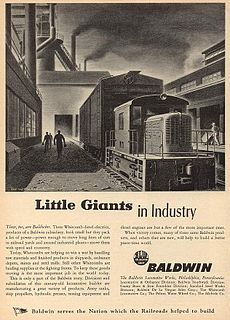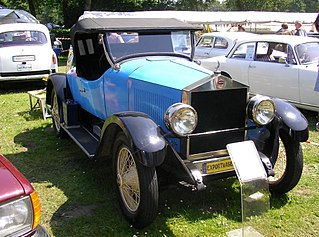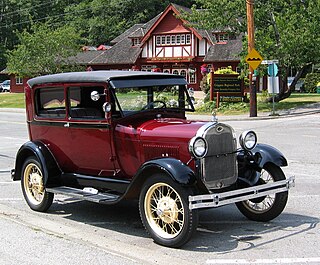
Automobiles Ettore Bugatti was a French car manufacturer of high-performance automobiles, founded in 1909 in the then-German city of Molsheim, Alsace by the Italian-born industrial designer Ettore Bugatti. The cars were known for their design beauty and for their many race victories. Famous Bugattis include the Type 35 Grand Prix cars, the Type 41 "Royale", the Type 57 "Atlantic" and the Type 55 sports car.
The Pierce-Arrow Motor Car Company was an American motor vehicle manufacturer based in Buffalo, New York, which was active from 1901 to 1938. Although best known for its expensive luxury cars, Pierce-Arrow also manufactured commercial trucks, fire trucks, camp trailers, motorcycles, and bicycles.
The Classic Car Club of America (CCCA) is an organization founded in 1952 to celebrate the grand automobiles of the prewar period. At the time, the vehicles covered by the Club were considered too modern to be of any interest by such organizations as the Antique Automobile Club of America and despite their often stupendous cost when new, were considered practically worthless.

An antique car is an automobile that is an antique. Narrower definitions vary based on how old a car must be to qualify. The Antique Automobile Club of America defines an antique car as over 25 years of age. However, the legal definitions for the purpose of antique vehicle registration vary widely. The antique car era includes the Veteran era, the Brass era, and the Vintage era, which range from the beginning of the automobile up to the 1930s. Later cars are often described as classic cars. In original or originally restored condition antiques are very valuable and are usually either protected and stored or exhibited in car shows but are very rarely driven.

The Geo D. Whitcomb Company was founded by George Dexter Whitcomb (1834–1914), of Chicago, Illinois, who started a modest machine shop in 1878, and began the manufacture of coal mining machinery, laying the foundation for the concern that became known as The Whitcomb Locomotive Company.

The Peerless Motor Car Company was an American automobile manufacturer that produced the Peerless brand of motorcars in Cleveland, Ohio, from 1900 to 1931. One of the "Three Ps" – Packard, Peerless, and Pierce-Arrow – the company was known for building high-quality luxury automobiles. Peerless popularized a number of vehicle innovations that later became standard equipment, including drum brakes and the first enclosed-body production cars.

The Erskine was an American automobile brand produced by the Studebaker Corporation of South Bend, Indiana, United States, from 1926 to 1930. The marque was named after Albert Russel Erskine (1871–1933), Studebaker's president at the time.

Roosevelt was a brand of American automobile that was manufactured by the Marmon Motor Car Company of Indianapolis, Indiana, United States, during the 1929 and 1930 model years.

Moon Motor Car Company was an American automobile company that was located in St. Louis, Missouri. The company had a venerable reputation among the buying public, as it was known for fully assembled, easily affordable mid-level cars using high-quality parts. Often this meant the manufacturing process required more human intervention, leading to operating losses.
Michel Saint-Denis, ditJacques Duchesne, was a French actor, theater director, and drama theorist whose ideas on actor training have had a profound influence on the development of European theater from the 1930s on.

The Ford Model A, was the second successful vehicle model for the Ford Motor Company, after its predecessor, the Model T. First produced on October 20, 1927, but not introduced until December 2, it replaced the venerable Model T, which had been produced for 18 years. This new Model A was designated a 1928 model and was available in four standard colors.

Carrosserie Pourtout was a French coachbuilding company. Founded by Marcel Pourtout in 1925, the firm is best known for its work in the decades prior to World War II, when it created distinctive and prestigious bodies for cars from numerous European manufacturers. Pre-war Pourtout bodies were mainly one-off, bespoke creations, typically aerodynamic and sporting in character. Among the company's customers was Georges Clémenceau, the physician and journalist who served as the prime minister of France from 1906 to 1909 and 1917 to 1920.

Edward Carl Stearns was the founder of several companies in the late 19th century in Syracuse, New York, including E. C. Stearns & Company, Stearns Automobile Company, Stearns Steam Carriage Company, Stearns Typewriter Company and E. C. Stearns Bicycle Agency.
Galba was a French automobile produced by a company created for the purpose between 1929 and 1930.

Majola was a French producer of engines and automobiles, established in 1908 and producing automobiles from 1911 till 1928.

Détresse et Charité, released in the United States as The Christmas Angel and in Britain as The Beggar Maiden, is a 1904 French short silent film directed by Georges Méliès. It was released by Méliès's Star Film Company and is numbered 669–677 in its catalogues.
The Walker Body Company, a former carriage manufacturer based in Amesbury, Massachusetts, began manufacturing metal automobile bodies in 1911. It went bankrupt in 1930. The manufacturing site remains as the Walker Body Company Factory.














